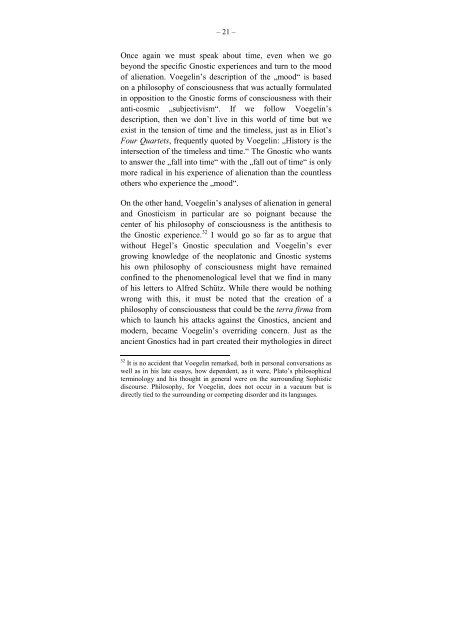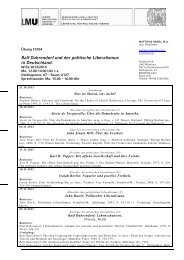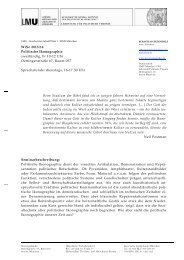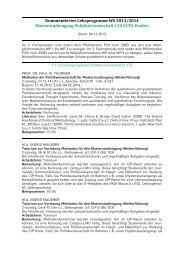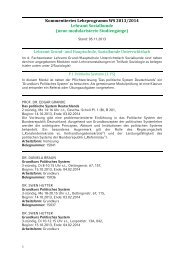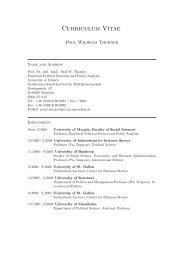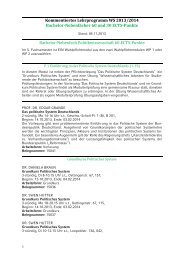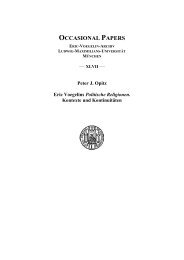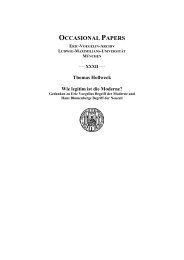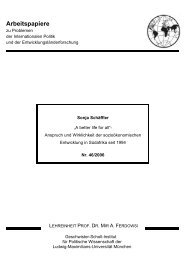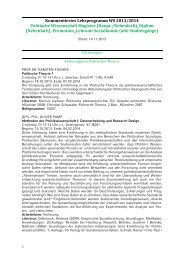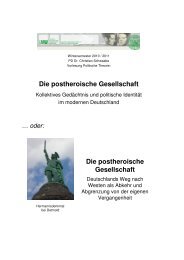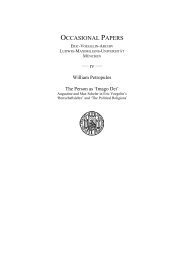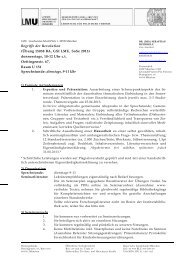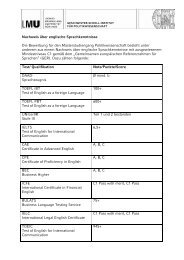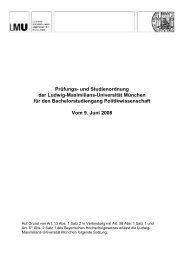THOMAS HOLLWECK is Associate Professor of German at
THOMAS HOLLWECK is Associate Professor of German at
THOMAS HOLLWECK is Associate Professor of German at
Create successful ePaper yourself
Turn your PDF publications into a flip-book with our unique Google optimized e-Paper software.
– 21 –<br />
Once again we must speak about time, even when we go<br />
beyond the specific Gnostic experiences and turn to the mood<br />
<strong>of</strong> alien<strong>at</strong>ion. Voegelin’s description <strong>of</strong> the „mood“ <strong>is</strong> based<br />
on a philosophy <strong>of</strong> consciousness th<strong>at</strong> was actually formul<strong>at</strong>ed<br />
in opposition to the Gnostic forms <strong>of</strong> consciousness with their<br />
anti-cosmic „subjectiv<strong>is</strong>m“. If we follow Voegelin’s<br />
description, then we don’t live in th<strong>is</strong> world <strong>of</strong> time but we<br />
ex<strong>is</strong>t in the tension <strong>of</strong> time and the timeless, just as in Eliot’s<br />
Four Quartets, frequently quoted by Voegelin: „H<strong>is</strong>tory <strong>is</strong> the<br />
intersection <strong>of</strong> the timeless and time.“ The Gnostic who wants<br />
to answer the „fall into time“ with the „fall out <strong>of</strong> time“ <strong>is</strong> only<br />
more radical in h<strong>is</strong> experience <strong>of</strong> alien<strong>at</strong>ion than the countless<br />
others who experience the „mood“.<br />
On the other hand, Voegelin’s analyses <strong>of</strong> alien<strong>at</strong>ion in general<br />
and Gnostic<strong>is</strong>m in particular are so poignant because the<br />
center <strong>of</strong> h<strong>is</strong> philosophy <strong>of</strong> consciousness <strong>is</strong> the antithes<strong>is</strong> to<br />
the Gnostic experience. 32 I would go so far as to argue th<strong>at</strong><br />
without Hegel’s Gnostic specul<strong>at</strong>ion and Voegelin’s ever<br />
growing knowledge <strong>of</strong> the neopl<strong>at</strong>onic and Gnostic systems<br />
h<strong>is</strong> own philosophy <strong>of</strong> consciousness might have remained<br />
confined to the phenomenological level th<strong>at</strong> we find in many<br />
<strong>of</strong> h<strong>is</strong> letters to Alfred Schütz. While there would be nothing<br />
wrong with th<strong>is</strong>, it must be noted th<strong>at</strong> the cre<strong>at</strong>ion <strong>of</strong> a<br />
philosophy <strong>of</strong> consciousness th<strong>at</strong> could be the terra firma from<br />
which to launch h<strong>is</strong> <strong>at</strong>tacks against the Gnostics, ancient and<br />
modern, became Voegelin’s overriding concern. Just as the<br />
ancient Gnostics had in part cre<strong>at</strong>ed their mythologies in direct<br />
32 It <strong>is</strong> no accident th<strong>at</strong> Voegelin remarked, both in personal convers<strong>at</strong>ions as<br />
well as in h<strong>is</strong> l<strong>at</strong>e essays, how dependent, as it were, Pl<strong>at</strong>o’s philosophical<br />
terminology and h<strong>is</strong> thought in general were on the surrounding Soph<strong>is</strong>tic<br />
d<strong>is</strong>course. Philosophy, for Voegelin, does not occur in a vacuum but <strong>is</strong><br />
directly tied to the surrounding or competing d<strong>is</strong>order and its languages.


